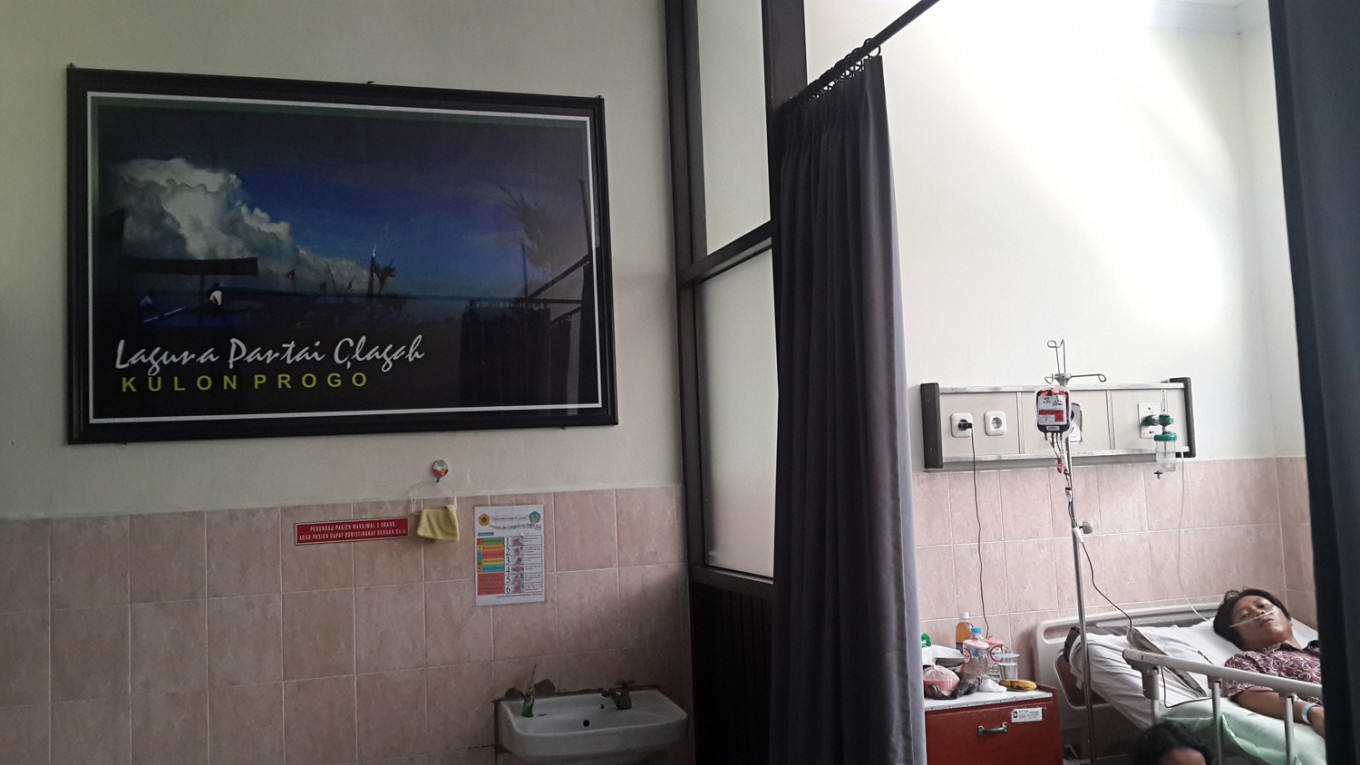Popular Reads
Top Results
Can't find what you're looking for?
View all search resultsPopular Reads
Top Results
Can't find what you're looking for?
View all search resultsKulon Progo offers "hospital without classes"
It seems the proverb that insists “poor people aren’t allowed to get sick” no longer applies in Kulon Progo regency, Yogyakarta
Change text size
Gift Premium Articles
to Anyone
I
t seems the proverb that insists “poor people aren’t allowed to get sick” no longer applies in Kulon Progo regency, Yogyakarta.
To give its people better access to healthcare, the Kulon Progo administration has specially designed a health-care program allowing all poor patients access to in-patient care at any treatment room at Kulon Progo Regional General Hospital (RSUD). The hospital also provides health-care services for residents who are not members of the Health Care and Social Security Agency (BPJS Kesehatan), with all medical expenses covered by the Kulon Progo administration using local Jamkesda health coverage funds.
“We have a program called ‘a hospital without classes’. If the Class 3 facilities are full, patients can use Class 1, Class 2 and even VIP rooms,” Kulon Progo Regent Hasto Wardoyo told thejakartapost.com on Monday.
Hasto further explained that the classless policy was valid not only for BPJS card holders but also all poor people, as long as they could show Kulon Progo resident ID, whether personal ID cards (KTP) or family cards (KK).
“A newborn baby who falls sick can receive medical treatment under this “hospital without classes” program. As long as he or she has been registered on a KK, we can cover him or her with Jamkesda funds,” said Hasto.
The Kulon Progo administration’s health policy is apparently a tacit criticism of the long and complicated mechanism widely complained of by users of the BPJS Kesehatan program.
“For many people, it is more beneficial to get an easier [health-care] procedure instead of free health-care services but with a complicated process,” said Hasto.
Thanks to its health policy, the Kulon Progo administration has progressed to the second phase of the United Nations Public Service Award (UNPSA) 2015 selection process.
The achievement was one of the factors in the government’s decision to appoint Kulon Progo regency host of the 20th Regional Autonomy Day celebrations held on Monday, the first time the celebrations had been held outside the State Palace in Jakarta.
RSUD Kulon Progo director Lies Indriyati said the “hospital without classes” policy was part of the government’s commitment, in place since 2102, to provide universal health-care coverage. The policy is part of the hospital’s efforts to provide health-care services for all people, including the poor, freeing the hospital from discrimination based on wealth.
“If previously poor people were ‘not allowed’ to get sick [because of medical expenses], they are now ‘allowed’ to get sick because their expenses are covered by the local administration,” Lies said.
The costs of all medical treatment, such as surgery, laboratory tests, radiology and many more, are the same for all patients, she said, from Class 3 to VIP patients. In fact, uniforming medical expenses for patients in all classes does not make the hospital incur losses.
 Natural care: A soothing illustration hangs on the wall of the hospital.(thejakartapost.com/Bambang Muryanto)
Natural care: A soothing illustration hangs on the wall of the hospital.(thejakartapost.com/Bambang Muryanto)
Currently, Kulon Progo hospital has 232 beds. There is also a Class D hospital with 30 beds in Sentolo district.
The service has occasioned long queues of patients wanting in-patient treatments at the hospital. To better accommodate the patients, the RSUD is currently developing additional facilities on a four-hectare plot behind the hospital.
One of the innovations in the health sector developed by the hospital is awareness for low birth-weight newborn babies (less than 2,500 grams), with a program aiming to reduce the maternal and infant mortality rate in the regency.
“We call this program ‘screenless health-care services’. Under the program, we carry out home visits once the babies are taken home by their families,” said Lies.
She added that hospital health workers also brought village midwives on the visits, so that they could monitor the treatment of the underweight babies in subsequent days.
“With this method, we hope we can push down our infant mortality rate, as one of the indicators in the Millennium Development Goals [MDGs] – now Sustainable Development Goals [SDGs]. In 2013, the number of infant mortality deaths reached around 70-80 cases per year and we hope that through this intervention, it can be reduced to only 45-50 cases,” said Lies.
In 2015, Kulon Progo’s screenless health-care program was among 99 public service innovations selected in a competition held by the Administrative and Bureaucratic Reform Ministry.
According to Lies, the hospital was also selected the fourth runner-up in a green hospital competition in 2015.
“We have placed natural scenery pictures in each room in the hope they will stop patients becoming depressed. They’re all pictures of natural tourist destinations in Kulon Progo,” said Lies.
During break hours, the hospital management plays classical and traditional music to create a relaxed and comfortable ambience.
Accompanying her husband who was undergoing treatment at the hospital, Widarti said she was using the Jamkesda facility, and that it had not taken long for her husband to get a room at the hospital.
“I waited for two hours to get a room at this hospital. Its service delivery is pretty fast,” said Widarti. (ebf)










